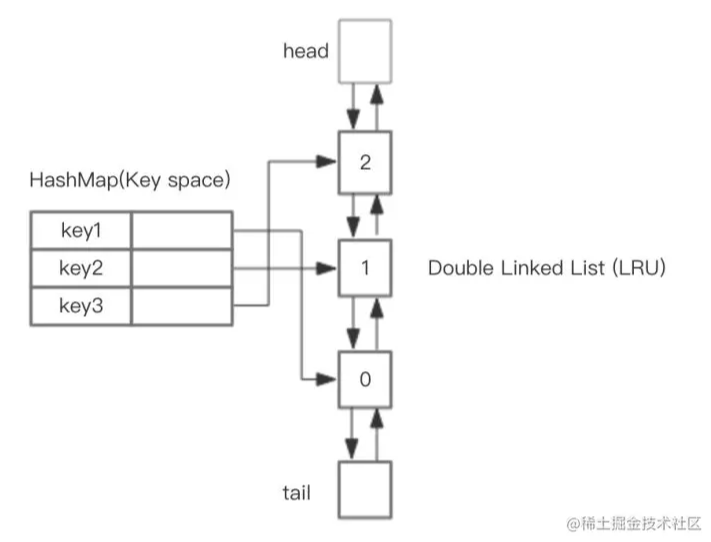LRU
LRU(Least Recently Used)是一种常见的缓存淘汰策略,用于在有限的缓存空间中选择最近最少使用的数据进行淘汰,为新的数据腾出空间
基本思想
当缓存空间已满时,优先淘汰最近最少使用的数据,以便为新的数据提供空间
它基于以下原则:
- 当某个数据被访问时,将其移动到最近使用的位置
- 当需要淘汰数据时,选择最久未使用的数据进行淘汰
- LRU 算法通常使用一个数据结构来维护缓存中的数据顺序,以便快速判断最近使用的数据和最久未使用的数据
TIP
常见的数据结构包括链表和哈希表的组合:
- 链表用于维护数据的访问顺序,每次访问数据时,将其移动到链表的头部或尾部,以表示最近使用或最久未使用的数据
- 哈希表用于实现快速的数据查找和插入操作,键为数据的标识符,值为对应的链表节点
链表和哈希表关系

缓存读写
- 缓存的读取:在哈希表中查找数据,如果存在则将对应节点移动到链表头部,并返回数据
- 缓存的写入:在哈希表中查找数据,如果存在则将对应节点移动到链表头部;如果不存在,则在链表头部插入新节点,并在哈希表中添加对应的键值对。如果缓存已满,还需要删除链表尾部的节点并从哈希表中移除对应的键值对
实现
map
- map 遍历顺序为成员插入顺序,满足 lru 思想
- 查询、插入时间复杂度 O(1)
js
/*
* [146] LRU 缓存
*/
const LRUCache = function (capacity) {
this.cache = new Map()
this.capacity = capacity
}
LRUCache.prototype.get = function (key) {
if (!this.cache.has(key))
return -1
const value = this.cache.get(key)
this.cache.delete(key)
this.cache.set(key, value)
return this.cache.get(key)
}
LRUCache.prototype.put = function (key, value) {
if (this.cache.has(key))
this.cache.delete(key)
this.cache.set(key, value)
if (this.cache.size > this.capacity)
this.cache.delete(this.cache.keys().next().value) // 返回第一个key, 先进先出
}/*
* [146] LRU 缓存
*/
const LRUCache = function (capacity) {
this.cache = new Map()
this.capacity = capacity
}
LRUCache.prototype.get = function (key) {
if (!this.cache.has(key))
return -1
const value = this.cache.get(key)
this.cache.delete(key)
this.cache.set(key, value)
return this.cache.get(key)
}
LRUCache.prototype.put = function (key, value) {
if (this.cache.has(key))
this.cache.delete(key)
this.cache.set(key, value)
if (this.cache.size > this.capacity)
this.cache.delete(this.cache.keys().next().value) // 返回第一个key, 先进先出
}